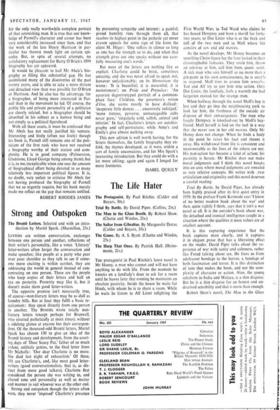Strong and Outspoken
The Brontë Letters. Selected and with an intro- duction by Muriel Spark. (Macmillan, 25s.)
LETTERS are written conversation, exchanges between one person and another, reflections of their writer's personality, like a voice. 'Literary' letter-writers often forget the conversation and make speeches; like people at a party who peer over your shoulder as they talk to see if some- one more exciting is within earshot, they are addressing the world in general instead of con- centrating on one person. These are the people who keep copies of their letters and half an eye on posterity. Posterity may like it, but it doesn't make them good letter-writers.
The opposite premise isn't necessarily true, of course—non-literary letters may be as dull as laundry bills. But at least they fulfil a basic re- quirement: they speak directly from one person to another. The Brontës wrote totally non- literary letters (except perhaps for Branwell, who strutted pathetically at most times), without a sidelong glance at anyone but their correspon- dent. Of the thousand-odd Brontë letters, Muriel Spark has chosen 130 to give an idea of the Brontë history and development, from the court- ing days of 'Dear Saucy Pat,' father of so much ardent, unlikely genius, to the final letter from Mr Nicholls: 'Our dear Charlotte is no more. She died last night of exhaustion.' Of these, 101 are Charlotte's, and, like most good letter- writers (good conversationalists, that is, as dis- tinct from mere good talkers), Charlotte first considered the person she was writing to, and altered tone and personality as well as matter and manner to suit whoever was at the other end.
Strong and outspoken though the letters often were, they never 'imposed' Charlotte's presence by presuming sympathy and interest: a painful, proud humility runs through them all, that reaches its highest point in the pathetic yet never craven appeals for some sign of life from the silent M. Heger: `One suffers in silence so long as one has the strength so to do, and when that strength gives out one speaks without too care- fully measuring one's words.'
But most of the letters are nothing like as explicit. Charlotte could be brisk, sometimes amusing, and she was never afraid to speak out, however unfashionably; on In Memoriam she wrote: `It is beautiful; it is mournful; it is monotonous'; on Pride and Prejudice: `An accurate daguerrotyped portrait of a common- place face.' Children, the governess's raison d'être, she seems mostly to have disliked : `desperate little dunces . . . excessively indulged,' `more riotous, perverse, unmanageable cubs never grew,' singularly cold, selfish, animal and inferior.' In fact, Charlotte's letters are autobio- graphy and self-portraiture; while Anne's and Emily's give almost nothing away.
This new edition is well worth having, for the letters themselves, the family biography they en- fold, the themes developed, as it were, within a sort of family unconscious, and for Mrs Spark's interesting introduction. But they could do with a lot more editing; again and again I longed for more footnotes.
ISABEL QUIGLY






























 Previous page
Previous page